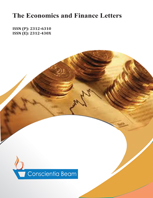Exploring the Asymmetric Linkage between Commodity Prices and Fiscal Performance in Nigeria
DOI:
https://doi.org/10.18488/journal.29.2019.62.134.148Abstract
The paper examines the asymmetric relationship between commodity prices and fiscal performance in Nigeria between 1984 and 2017 using the non-linear autoregressive distributed lag (NARDL) cointegration technique. In the analysis, the existence of a long-run cointegration relationship between the oil prices, cocoa prices and fiscal outcome is confirmed as well as the asymmetric impact of commodity prices. The study shows that changes in oil prices have a substantial influence on both debt (% of GDP) and external debt stocks. It is demonstrated that since Nigeria’s fiscal operation is largely financed by the proceeds from commodity exports, especially crude oil, in the long run, unanticipated rise or decline in oil prices could have significant effect on public debt levels in the country. Further evidence reveals that an increase in cocoa prices positively and strongly enhances debt (% of GDP), but with no evidence of such effect on external debt stocks, indicating that an increase in cocoa price may not result to a large reduction in external debt stocks. In sum, the study asserts that there is a host of potential significant impacts associated with primary commodity prices (cocoa) on fiscal policy design and economic development in both long and short run. Hence, the study posits that to cushion the effect of commodity price fluctuations, it is crucial to launch several initiatives that would enhance the diversification of the economy. This can be better achieved through the provision of financial incentives and strong regulatory framework for the development of agricultural sector.

